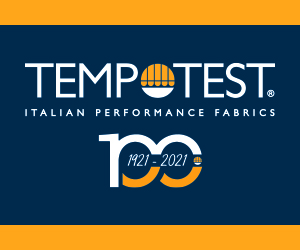JST America Opens Dedicated Made-ups Mill in China
July 30, 2003
HIGH POINT - Upholstery manufacturer JST America Inc. broke ground on construction of a dedicated made-ups mill in China, and will expand its showroom later this summer. When the 520,000-square-foot cut-and-sew mill is completed, JST will be able to ramp up service to American soft goods suppliers.
''In the last couple of months, our bedding line is getting lots of attention from U.S. manufacturers,'' said Jason Jiang, CEO. ''We are ready to work with the U.S. bedding manufacturers and marketers like Springs, Divatex, Westpoint Stevens.''
The new mill, whose groundbreaking was attended by the mayor of Hangzhou, will cut and sew made-ups. With it, JST now owns a majority share of four China-based manufacturing campuses. Cumulatively, the company is vertical with chenille yarn-making, yarn-dyeing and finishing operations embedded in the other three upholstery-weaving plants.
JST America went into business nine years ago, shipping textiles from China to American furniture makers, who, Jiang says, are ''famous for being selective.'' La-Z-Boy and Flexsteel buy American Century Home, the brand name under which JST America markets upholstery textiles in the U.S.
''(Textiles for) furniture is the highest standard in the industry,'' he said.
''So many companies are importing fabrics from China,'' Jiang said. ''Even furniture companies tried to jump in, but many got burned. It's not realistic. When the goods arrive from China, after 10,000 miles, you cannot return them. The majority of Chinese vendors require you to sign a letter of credit: As soon as you get the goods you have to pay them. That's why we put our goods at High Point. That's why lots of people come back.''
JST also stocks products in Tupelo, Miss., and High Point. Senior vice president for cut-and-sew George Kerr said that the company's goal is to have in stock a full line of fabrics, fringes, sofa covers and bedding products.
With so many interests to direct, Jiang said he spends more than two hours a night on the phone with China, coordinating logistics. ''It takes lots of pains to do this. Lots of details and minor things. It's non-stop.''
He travels to China regularly, undeterred thus far by the outbreak of SARS. ''What will come, will come. I never worry, even while I stayed in China. I've been to more dangerous places than SARS countries - like some South American countries. I really think after June, I wish it can be controlled.''
Meanwhile, Jiang and his team, which includes president Tom Finneran and designer Stacy Brasco, are focusing on solidly launching its made-ups endeavor. The company is expanding its piece goods showroom on the eighth floor of Market Tower at High Point to accommodate made-ups.
''Growing demand pressured us to make this move,'' Jiang said, a sentiment that may become more frequent among upholstery manufacturing principals now that Westpoint Stevens has filed for Chapter 11 bankruptcy protection. ''In the U.S. market, the consumer confidence is up and I think we'll have a great year. I think most of the fabric companies will. Bedding could be of equal value to us for upholstery.''
''In the last couple of months, our bedding line is getting lots of attention from U.S. manufacturers,'' said Jason Jiang, CEO. ''We are ready to work with the U.S. bedding manufacturers and marketers like Springs, Divatex, Westpoint Stevens.''
The new mill, whose groundbreaking was attended by the mayor of Hangzhou, will cut and sew made-ups. With it, JST now owns a majority share of four China-based manufacturing campuses. Cumulatively, the company is vertical with chenille yarn-making, yarn-dyeing and finishing operations embedded in the other three upholstery-weaving plants.
JST America went into business nine years ago, shipping textiles from China to American furniture makers, who, Jiang says, are ''famous for being selective.'' La-Z-Boy and Flexsteel buy American Century Home, the brand name under which JST America markets upholstery textiles in the U.S.
''(Textiles for) furniture is the highest standard in the industry,'' he said.
''So many companies are importing fabrics from China,'' Jiang said. ''Even furniture companies tried to jump in, but many got burned. It's not realistic. When the goods arrive from China, after 10,000 miles, you cannot return them. The majority of Chinese vendors require you to sign a letter of credit: As soon as you get the goods you have to pay them. That's why we put our goods at High Point. That's why lots of people come back.''
JST also stocks products in Tupelo, Miss., and High Point. Senior vice president for cut-and-sew George Kerr said that the company's goal is to have in stock a full line of fabrics, fringes, sofa covers and bedding products.
With so many interests to direct, Jiang said he spends more than two hours a night on the phone with China, coordinating logistics. ''It takes lots of pains to do this. Lots of details and minor things. It's non-stop.''
He travels to China regularly, undeterred thus far by the outbreak of SARS. ''What will come, will come. I never worry, even while I stayed in China. I've been to more dangerous places than SARS countries - like some South American countries. I really think after June, I wish it can be controlled.''
Meanwhile, Jiang and his team, which includes president Tom Finneran and designer Stacy Brasco, are focusing on solidly launching its made-ups endeavor. The company is expanding its piece goods showroom on the eighth floor of Market Tower at High Point to accommodate made-ups.
''Growing demand pressured us to make this move,'' Jiang said, a sentiment that may become more frequent among upholstery manufacturing principals now that Westpoint Stevens has filed for Chapter 11 bankruptcy protection. ''In the U.S. market, the consumer confidence is up and I think we'll have a great year. I think most of the fabric companies will. Bedding could be of equal value to us for upholstery.''
















